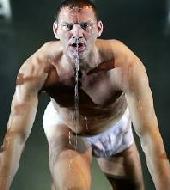SEARCH
REVIEWS
FEATURES
NEWS
Etcetera and
Short Term Listings
LISTINGS
Broadway
Off-Broadway
BOOKS and CDs
OTHER PLACES
Berkshires
London
LA/San Diego
Philadelphia
Elsewhere
QUOTES
On TKTS
LETTERS TO EDITOR
FILM
LINKS
MISCELLANEOUS
Free Updates
Masthead
Writing for us
A CurtainUp  London Review
London Review
 London Review
London ReviewWoyzeck
|
Congratulations, you are the lowest form of humanity!
---- Chorus leader |

Ingar E Sigurdsson as Woyzeck
(Photo: Eggert Jónsson) |
Büchner's elliptical text, tantalizingly left after his death in a bundle of near-indecipherable notes, retells a true story which had appeared in contemporary medical journals. Franz Woyzeck was a man who killed his adulterous mistress and, despite doubts surrounding his sanity, was hanged for the murder. In Büchner's hands, the story becomes full of class consciousness, as Franz is the epitome of the poor, downtrodden worker, constantly humiliated and eventually overwhelmed by the forces surrounding him. His love for his wife Marie is the single compensatory factor in an otherwise miserably oppressed life.
The distinctive, almost otherworldly aesthetic presents the undefined industrialist dystopia of "Division Four". In the background, there is an elaborate framework of imposing, metal pipes, upon which boiler-suited workers clamber with torches. The floor is covered in turf, part of which is carried off halfway through to reveal a panel of glass water tanks. Into this water the characters dabble, launch themselves and swim. Trapezes are not absent, and add a powerful dimension to the stage movement.
Amid this explicitly non-naturalistic set, however, the keynote is suffering, tortured humanity. The slow speaking, heavily accented Franz (Ingvar E Sigurdsson) is repeatedly told that he "always looks so haunted" because he "thinks too much". He is continually mocked, beaten up, strung up on a trapeze with catheter attached, and generally treated in so degrading a manner that his nobility emerges in the face of his unprovoked torment. At a party, everyone dances in marionette-like, stylised movements but Franz is grabbed, a dome is placed over his head and is filled with water. As he nearly drowns, he is exploited as a festive exhibit.
Nína Dögg Filippusdóttir plays a sympathetic, honest Marie led astray by the charismatic Drum Major (Björn Hlynur Haraldsson). His first appearance, aloft on a trapeze, is truly dynamic. Until this point, there is little music, performed by a simple, meagre band. When the Drum Major appears, however, the full force of the withheld music is let loose and his powerful, loud rock song helps you understand Marie's temptation. During his beautifully written love ballad he points to various points in the ceiling, from where flowers dart down, planting themselves upright in the ground. Again, in a display of his effortless supremacy, he plays beach-ball with a globe. A chorus accompany him, sporting black suits, dark-glasses and outsized hair-quiffs. They enigmatically seem to represent a caricature of Nick Cave and the Bad Seeds.
There are a host of other boldly realized, individualistic characters: Andres, the etiolated, equally powerless friend (Ólafur Egill Egilsson); the harshly cruel Doctor (Harpa Arnarsdóttir) followed by a mute assistant who wears a white ballet tutu (Jóhannes Niels Sigurdsson); and the Barry White-style deity who sits aloft at a miniature piano (Ólafur Darri Ólafsson).
Audience members who choose to see this production on the strength of Nick Cave's music might be disappointed in its relative scarcity. However, this allows the play to speak for itself and skilfully avoids any conflict of artistic genius. Expectations are necessarily high after Tom Waits' and Robert Wilson's first-rate version a few years ago (Our Review) Nevertheless, similar characteristics make them both suited to tackle this play: a sort of rugged lyricism and their exceptional ability to portray menacing violence and morbidity, but also to capture gentle, universal sympathy.
As a result, the music manages to convey Woyzeck's tragic suffering with intense human pathos in a hostile, overbearing world. This truly unique production will assail your senses with captivating images which are by turn surreal, preposterous, and deeply-affecting.
| WOYZECK
Written by Georg Büchner Music by Nick Cave and Warren Ellis Directed by Gísli Örn Gardarsson With: Ingvar E Sigurdsson, Nína Dögg Filippusdóttir, Björn Hlynur Haraldsson, Ólafur Egill Egilsson, Harpa Arnarsdóttir, Jóhannes Niels Sigurdsson, Ólafur Darri Ólafsson, Víkingur Kritjánsson, Árni Pétur Gudjónsson, Erlendur Eikíksson, Andri Ólafsson, Bjarni Bjarnason, Haraldur Ágústsson, Haraldur Björn Halldórsson, Hjalti Ţor Ţorsson, Ívar Örn Árnason, Karl Erlingur Oddason, Karl Sigurdsson, Kristbjörn Helgason, Kristján Dereksson, Steingrímur Karl Teague Stage Design: Börkur Jónsson Lighting Design: Lárus Björnsson Costume Design: Filippía Elísdóttir Movement Consultant: John-Paul Zaccarini Sound: Olafur Örn Thoroddsen Presented by Vesturport Theatre Co-produced by Reykjavik City Theatre, the Young Vic, BITE 05 and Barbican as a part of Young Genius Running time: 90 minutes with no interval Box Office: 0845 120 7554 Booking to 22 October 2005 Reviewed by Charlotte Loveridge based on 12th October 2005 performance at the Barbican Theatre, Silk Street London EC1 (Tube: Barbican) |





